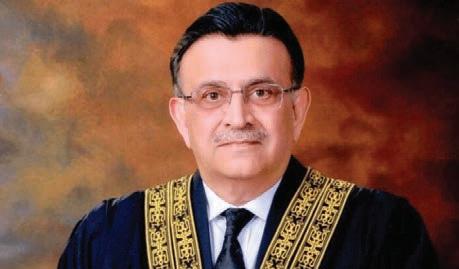
2 minute read
CJP takes suo motu notice of delay in Punjab, KP polls
islamabad staff report
Chief Justice of Pakistan (CJP) Umar Ata Bandial on Wednesday took suo motu notice of the delay in holding polls in Punjab and Khyber Pakhtunkhwa, saying that there appeared to be a “lack of clarity” on the matter.
Advertisement
Elections are to take place in both provinces after previous PTI governments had dissolved their assemblies before the expiry of their five-year mandated term on the orders of party chairman Imran Khan.
It is pertinent to mention that the suo motu notice comes two days after President Dr Arif Alvi on Monday unilaterally announced April 9 as the date for holding elections in both the provinces after his invitation for consultations on the matter was turned down by the Election Commission of Pakistan (ECP).
The CJP has constituted a ninemember bench to hear the case and ordered the matter to be fixed for hearing tomorrow (Thursday) at 2pm.
The bench comprises the CJP, Justice Ijazul Ahsan, Justice Syed Mansoor Ali Shah, Justice Munib Akhtar, Justice Yahya Afridi, Justice Sayyed Mazahar Ali Akbar Naqvi, Justice Jamal Khan Mandokhail, Justice Muhammad Ali Mazhar and Justice Athar Minallah.
In the notice, CJP Bandial said that the SC bench would consider the following questions:
Who has the constitutional responsibility and authority for appointing the date for the holding of a general election to a provincial assembly, upon its dissolution in the various situations envisaged by and under the Constitution?
How and when is this constitutional responsibility to be discharged?
What are the constitutional responsibilities and duties of the federation and the province with regard to the holding of the general election?
In the notice, the CJP said two SC judges, in an order dated February 16, had referred the matter to him for suo motu proceedings. He noted that separate pleas had also been filed in the apex court regarding the delay in holding polls.
He further noted that the Lahore High Court (LHC) had directed the ECP to immediately announce the date for polls in Punjab. He said that the Punjab governor and the ECP had filed intra-court appeals which were currently pending.
“It seems to be the governor’s case that since he did not act on the advice tendered by the then-chief minister and made no order dissolving the assembly, he does not have the responsibility or authority to appoint the date for the general election. The election commission has, it appears, also taken the position that under the Constitution it has no authority to appoint the date for a general election, though it has categorically stated (as reported in the public media, both print and electronic) that it is fully committed to conducting the said election in accordance with the Constitution.”
He further said that the KP governor had also not fixed a date for holding polls and a petition in this regard was pending before the Peshawar High Court.
CJP Bandial went on to say that the president had taken the position that he had the authority and responsibility for fixing a date, and had announced that polls would be held on April 9.
The CJP said that over a month had passed since the two provincial assemblies were dissolved, adding that “it seems prima facie that even the matter of appointing the date of the general elections, which is the first step towards the holding of the elections, has still not been resolved”.
CONTINUED ON PAGE 05






